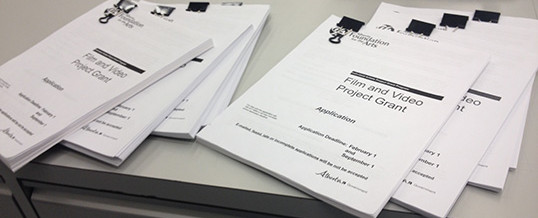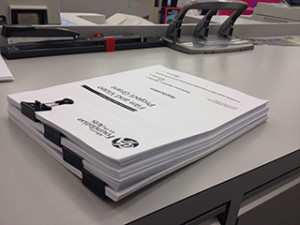
Ahhh Alberta Filmmaking Grants… what polarizing, frustrating, wonderful beasts. Whether you love ‘em or hate ‘em (or both), you can’t deny that a grant can make the difference between a screenplay and a finished film.
Full Swing has had modest success with our grant applications over the years, and as we find ourselves in the middle of the early-year grant application season, we wanted to share a few grant-writing tips we’ve learned along the way.
1 – Apply, apply, apply
Some filmmakers are afraid to apply for grants. They think the chances of getting them are slim and they’re not worth the effort, or they don’t know where to start, or they get jaded quickly by the system when they hear “no” once or twice.
We’re firm believers that you can’t apply for too many grants. Matt and I have read the word “Unfortunately” more times than we can count, but that’s the business. You need to thicken your skin anyway.
Grants are often perceived as biased or muddied in politics. I’m sure the truth varies from grant to grant, but the practice of applying for them is something every serious filmmaker should go through. As Matt so often points out: applying for a grant, whether you get it or not, will strengthen your film by forcing you to think about it in new and challenging ways.
When you apply for a grant, you’ll have to ask yourself serious questions about your film. Questions you may not have had to answer before, like: Is this film viable? What is it going to cost?…..What is it about?
Every time you answer these questions, you make your project stronger. In the end, whether you get the grant or not, you’ll have worked some of the bugs out, and you’ll have a better understanding of what your film is, what it will cost, how you can get it finished etc.
Caveat: Some grants have application limits and should be chosen strategically. You should only apply for a grant if it’s appropriate for your project or for you as a filmmaker. Don’t know what’s appropriate? Read the grant’s guidelines!
2 – Put yourself in the judge’s shoes
All filmmaking and artist grants are fundamentally the same: cash or tax incentives or in-kind donations designed to promote and build our culture or create Canadian content. The organizations, whether mandated or not, WANT to give them out. It’s their purpose!
But they don’t want to throw their money away. They want their grant to be responsible for great content. They want their grant program to look good. They want the kudos!
So as you’re writing your grant, make sure you clearly articulate the following:
- Your goals for this film are in line with the goals of the grant
- You have the ability to make a product of quality (see Tip 4 for more)
- You have the ability, the means, and the commitment to FINISH YOUR FILM
- You have the technical expertise to finish your film (are you shooting on the RED? Demonstrate you understand the workflow. Do you have a heavy VFX component? Demonstrate your capability to deliver as promised)
Caveat: don’t pander to the judges or tell them what they want to hear. I’m saying seriously consider what this grant is trying to achieve, and explain how your project is going to help them get there.
3 – Start Early, Finish Early
Grant applications take a lot longer than they seem at first. Once you’ve got a few under your belt, you’ll have a lot of the groundwork done (such as resumes, bios, corporate overviews etc.), but some requirements that may seem simple actually chew up hours, and some require relying on other people, which always expands timelines.
Imagine you need a letter of support from an established industry professional, or a resume from a cinematographer. If you’re starting the application a week before it’s due, that doesn’t leave much notice for them, nor does it reflect well on you when you ask!
Finally, the act of submitting your application always takes longer than you estimated. 100-page applications need to be printed, copied, collated and mailed (sometimes across the country). Some grants let you submit online, but you may need to specifically request an account number or password, which can take processing time on someone else’s end.
What’s stopping you from setting a personal deadline a few days or even a week before the real deadline? Forego the stress, and give yourself more time than you think you need.
4 – Polish your grant application
The judges want to know you can deliver a quality product, and your application is your chance to prove it to them. Everyone says how great their film will be, but this is your chance to SHOW it.
Grant packages are a collection of documents from many sources. Project outlines, resumes from various creatives, scripts, letters of recommendation, bios, the list goes on. If you can take all of those elements and create a cohesive package, you’ll have a leg up.

Quick tips:
- Create a wordmark for your film. It doesn’t have to take days, but it shows you’ve put some creative thought into your project’s style.
- Create a header/footer for every page in your application with the wordmark, the grant’s name, your name, the page’s topic and page number.
- Format all of your pages the same (unless it’s a signed letter of reference or something that requires authenticity of origin). Stay consistent with your margins, fonts, headings, etc.
- If you’ve got time (read Tip 3), spend a few hours in a document layout program like InDesign or Microsoft Publisher and create a nice title page and cohesive style.
- Again, if time permits, spend a few bucks and get your application professionally printed. A nicely printed/bound application will prove you care about this package.
This is a great way to show your attention to detail, which will give your judges a good gut feeling about your project (gut feeling = super important).
These may seem like obvious tips, but in the fluster of the grant application process, they can easily be forgotten or abandoned due to lack of time (see Tip 3).
Share
MAR



About the Author:
Scott Westby is a Writer, Director and Producer in Calgary's film industry. He's a 2008 graduate of SAIT's Film & VIdeo Production Program, and has years of experience in strategic marketing and content creation for traditional and new media. A Taco/Slurpee enthusiast and a hater of mushrooms.